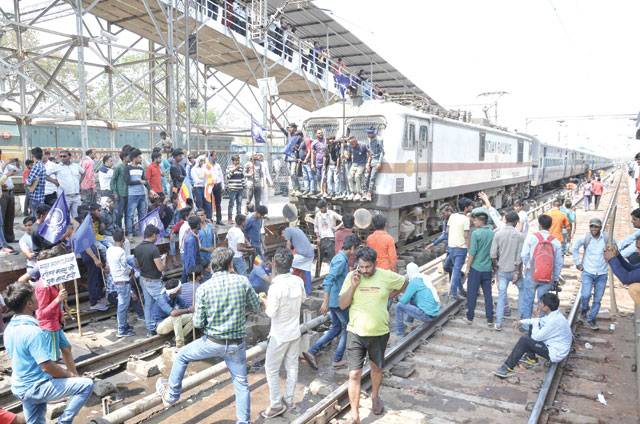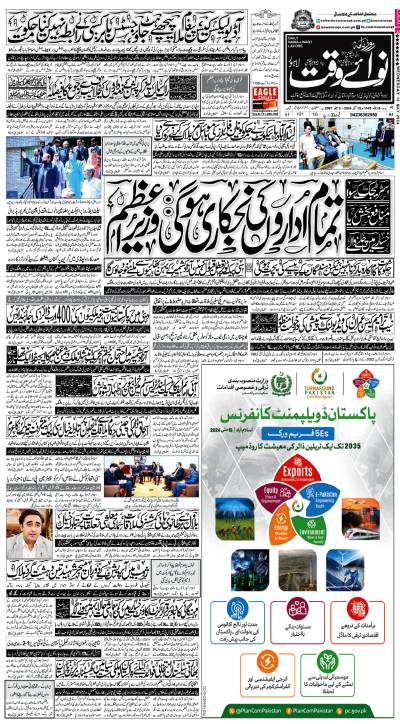Lahore - As occupying Indian forces tightened their clampdown on Kashmir to suppress the demand for right to self-determination, violence erupted on Monday in many northern states of India.
Low caste Dalits came on the streets to protest against Supreme Court’s diluting a law promising them protection against power abuse by the authorities.
At least nine persons were killed and hundreds injured in Monday’s violence across several states as low cast protesters blocked trains, clashed with police and set fire to private and public properties, including police posts, during a nationwide ‘bandh’ called by Dalit groups, Press Trust of India reported officials as saying.
Thousands were detained following widespread incidents of arson, firing and vandalism across over 10 states, several of them being BJP-ruled including Madhya Pradesh where at least six persons died during the protests against the alleged dilution of the Scheduled Caste and Scheduled Tribe (Prevention of Atrocities) Act.
Two persons died in Uttar Pradesh and one in Rajasthan, according to officials there. Other states hit with violence included Punjab, Bihar, Jharkhand, Odisha, Gujarat, Haryana, Maharashtra and Delhi. Those arrested included a former BSP MLA in UP.
Kashmir situation
On the other hand, in Kashmir, where Indian forces killed 17 Kashmiris and injured around 200 demonstrators on Sunday, life came to a grinding halt amid a security clampdown and a strike sponsored by freedom movement leaders against the brutal Indian rule.
Besides the deaths, many civilians lost their eyesight fully or partially when police in different areas south of the main city of Srinagar fired live rounds and pellet guns at the protesters on Sunday, the worst day of violence in the Occupied Valley since 2016.
Armed police and paramilitary soldiers in riot gear fanned out across the region on Monday and patrolled streets in anticipation of more anti-India protests and clashes, as per media reports coming out from the besieged valley.
Authorities also clamped a curfew in the old parts of Kashmir’s main city of Srinagar, the urban centre of protests and clashes against Indian rule. According to Times of India, internet service remains suspended in the area since Sunday.
The puppet authorities also placed top Hurriyat leadership – including Syed Ali Gilani, Mirwaiz Umar Farooq, Muhammad Ashraf Sehrai and Muhammad Yasin Malik – either under house detention or in jail to prevent them from leading anti-India protests on Monday.
According to Kashmir Media Service (KMS), Gilani, Mirwaiz and Sehrai were put under house arrest in Srinagar, while Muhammad Yasin Malik was arrested from his Maisuma residence in Srinagar and lodged at Kothibagh police station.
The Jammu and Kashmir Liberation Front (JKLF) spokesman in a statement issued in Srinagar said that a large posse of police arrived at Yasin Malik’s residence on Monday and took him along. He was lodged in Kothibagh police station in Srinagar.
The shutdown in the occupied valley is part of a two-day strike given by the Joint Resistance Leadership comprising Gilani, Farooq and Malik. As per the JRL call, funeral prayers in absentia were offered for the martyrs of Sunday’s crackdown.
Commercial establishments and offices are also closed, while the puppet administration has already ordered closure of all educational institutions.
All examinations scheduled for Monday were postponed by all three universities including Kashmir University, Islamic University and Central University. Public transport remained off the road.
Dozens blinded
Earlier on Sunday, thousands took to the streets in support of the freedom fighters, who have been struggling for decades for independence or for a merger with Pakistan.
Police opened fire with live rounds and pellet guns on mourners attending the funerals of slain freedom fighters and on crowds who threw stones and chanted slogans against Indian rule.
AFP reported doctors as saying on Monday the extent of pellet gun injuries was the worst they had seen since hundreds were wounded in unrest that followed the shooting death of charismatic freedom fighter Burhan Wani in July 2016.
“Most of them have pellets in their eyes,” said Dr Saleem Tak, medical superintendent at the Shri Maharaja Hari Singh Hospital in Srinagar, of the 45 patients who arrived at the hospital after Sunday’s violence.
“This was the highest number of these injuries received in the hospital on a single day since 2016.”
Amnesty International has called for the pellet guns to be banned, describing them as cruel and indiscriminate weapon.
One man who declined to give his name for fear of reprisals told AFP his two teenage sons were struck by pellets while attending a militant’s funeral.
“The doctors are trying to save their eyes. We have to give these sacrifices for freedom,” he said.
Another woman tended to her son, who wore a bandage over a damaged eye.
“They say everything is fine in Kashmir, but look what happens here,” she said, also declining to give her name.
More on Dalit protests
Curfew was imposed in several places on Monday, while the Union Home Ministry, which rushed 800 anti-riot policemen to MP and UP, asked all states to take preventive steps and maintain public order to ensure the safety of lives and property. The Army and paramilitary forces were also put on standby in Punjab, according to a PTI report.
In MP, the deceased included four Dalits and two upper caste Hindus, while several others were injured across the state, the officials said.
Inspector General (law and order) Makrand Deoskar told PTI that the casualties occurred during fights between the bandh supporters and its opponents and not due to police firing. A sub-divisional magistrate (SDM) and a police official were also injured in the protest in Gwalior-Chambal division, he said.
MP Chief Minister Shivraj Singh Chouhan appealed to the protesters to maintain peace in the state.
Transport, mobile and internet services were hit in many states with over 100 trains getting affected due to protests, even as the Centre moved the Supreme Court seeking review of its recent judgement on the SC/ST Act, maintaining that the verdict will violate constitutional rights of these communities.
The Supreme Court had on March 20 diluted certain provisions of the Scheduled Caste and Scheduled Tribe (Prevention of Atrocities) Act, in a bid to protect ‘honest’ public servants discharging bona fide duties from being blackmailed with false cases under the Act.
The verdict is being widely criticised by Dalits and the Opposition who claim that the dilution of the Act will lead to more discrimination and crimes against the backward community.
While some states had ordered the closure of educational institutions as a precautionary measure, incidents of arson, firing and vandalism were reported from various parts of the country and the properties facing the wrath of protesters included railway tracks, police stations as also public and private vehicles.
In UP, one person was killed in Muzaffarnagar and another in Meerut, while nearly 75 persons including 40 policemen were injured in violent protests in various parts of the state. Police have detained nearly 450 people there.
In Rajasthan, one person was killed and 26 others, including nine policemen, were injured in Alwar.
Home Minister Rajnath Singh appealed for peace, while Law Minister Ravi Shankar Prasad said the government was not a party to the Supreme Court decision on the SC/ST Act and “respectfully” did not agree with its reasoning behind the verdict.
Prasad said the government has filed a very comprehensive review petition in the matter.
Union Minister Ram Vilas Paswan, a prominent Dalit leader and head of NDA constituent LJP, appreciated the government’s quick decision.
Senior Congress leader Ghulam Nabi Azad alleged that incidents of atrocities on Dalits and minorities have increased in the country since the NDA came to power in 2014, while AAP leader and Delhi Chief Minister Arvind Kejriwal extended his support to the protesting groups.
UP Chief Minister Yogi Adityanath appealed for peace and urged the people not to vitiate law and order, as violence was reported from many districts including Azamgarh where protesters torched two state-run buses, injuring several passengers.
Expressing her party’s support to protests, BSP supremo Mayawati alleged that some anti-social elements instigated violence leading to loss of lives and damage to properties.
The CBSE postponed Class 12 and Class 10 examinations scheduled to be held today in Punjab.
In the national capital region, protesters squatted on tracks at several places stopping trains, while protesters shouting slogans of ‘Jai Bhim’ also blocked roads affecting traffic movement, police said.
In Patna, protesters stormed the railway station, forced closure of ticket counters and squatted on tracks disrupting the movement of a number of trains.
Normal life was also affected in several parts of Odisha where activists of different Dalit groups put up road blockades. Thousands were arrested across Bihar, Jharkhand and Odisha, while the impact was minimal in West Bengal through its Chief Minister Mamata Banerjee expressed her support for the Dalit cause.
Major towns and cities of Gujarat also witnessed protests while civic-run transport services were halted after some of the buses were targeted by agitators.
Protests for rights go out of India’s hand
News Desk






